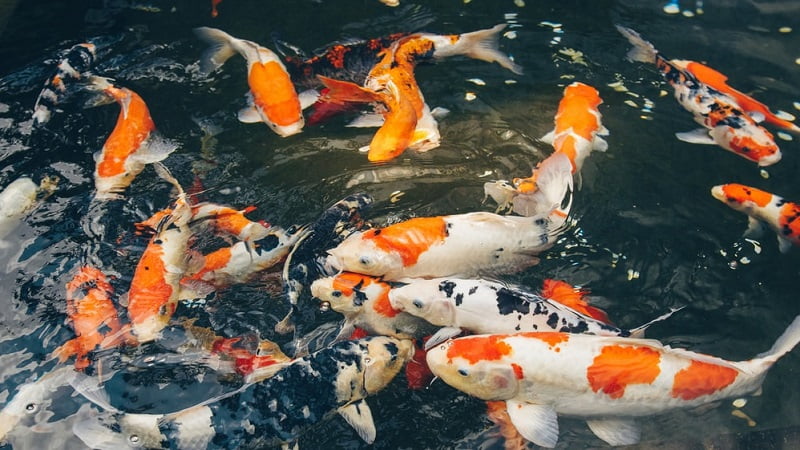Koi fish are one of the fascinating fish varieties not only because of their beautiful appearance but also due to their fantastic jumping. It may be entertaining to watch koi jump, but you can find it quite confusing when they insist on jumping out of the water. This is usually the leading cause of their death, even though they are quickly returned to the water.
Knowing that fish jumping is normal, but this behavior can indicate something wrong with their water environments. That’s why figuring out “why do koi fish jump out of the water?” is critical to protect them. Also, to do that efficiently, you will need to try a few different solutions to find the best one for your koi fish.
This article will provide you with several reasons for “why do koi fish jump out of the water?” and practical solutions. Even if it can be difficult to tell what the issue is simply by looking at the fish pond, understanding what is happening can help you come up with appropriate solutions.
Why Do Koi Fish Jump Out Of The Water?
Koi fish like to jump and they are natural jumpers thanks to their solid and sleek bodies. While they may sometimes jump just for fun, they often do so due to problems with their pond or water, such as a shortage of oxygen levels or existing toxic stagnation. It will be easier for you to reduce the probability of your koi jumping if you understand the reason behind that behavior.
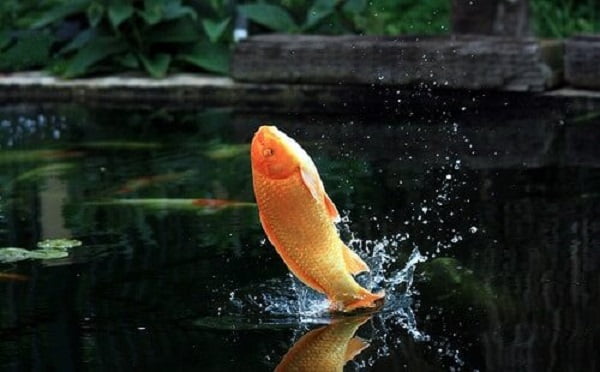
Here are the main causes of koi fish jumping:
Poor water quality
The fish may try to jump out of your water if the quality is poor. Toxins in the water or an unstable environment may prompt the fish to turn to their original instincts and leave. This is probably one of the most common reasons that koi jump out of their water.
Poor water quality may result from oxygen deficiency and high nitrate or high ammonia concentrations.
Lacking oxygen
Like many living creatures, oxygen in the water is essential for koi fish to survive. Koi fish will constantly jump to gasp air if their ponds have low oxygen levels.
You can tell whether the pool lacks oxygen by observing your koi fish behaviors. When the water presents a low oxygen level, your koi will typically congregate toward the pond’s water surface to get more air for breathing.
In fact, the reason is not necessarily low oxygen levels. It can simply be insufficient circulation in the water, leading to low oxygen in certain areas of the pond. Thus, when your koi spend time together in those water areas, they may face oxygen shortages. This may cause them to assemble at the top and even jump out of the water on purpose.
High in ammonia and nitrate concentrations
Ammonia concentration levels in the water may rise when the fish excrete excessive waste. When the pond is high in ammonia proportions, your koi fish can experience burning sensations in their gills, which may cause them to jump in an attempt to get rid of the discomfort.
In addition, a significant increase in ammonia can cause too much nitrate to be discharged into water. If your fish are exposed to high nitrate concentrations, their spleens, livers, kidneys, and nervous systems may suffer severe damage.
Shallow depths and lack of shade
During summer, or when temperatures are high during the daytime, your koi will need shaded areas to avoid the burning heat from the sun. While doing so, they might be searching for deeper waters where they can perfectly hide. If the ponds are absent shading places, your koi might jump because they try to find a place to get some shade from the hotter temperatures.
Overcrowding
Your koi fish may also start jumping out of the water in a too crowded pond to gain some breathing space. In such situations, you may want to relocate some of the other koi to another pond. This will minimize the injuries that can occur from excessive jumping and provide more space for them to breathe efficiently.
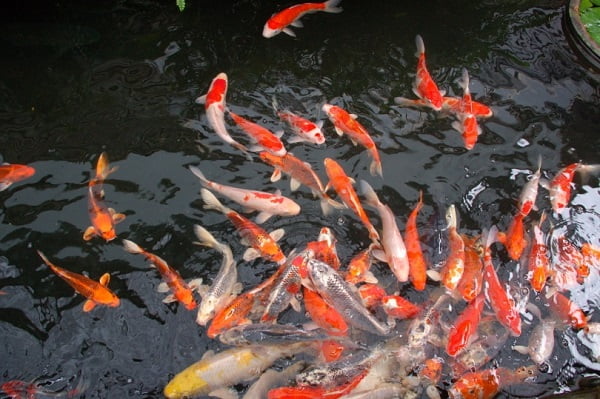
Avoiding aggression and predators
Koi fish is typically peaceful and may jump to avoid aggression from other fish varieties. Jumping out of the water is also a way for koi fish to escape predators.
The predators of koi fish probably include those inside and outside the pond. The outside predators can be, for example, cats, raccoons, birds, otters, and coyotes. Predators apparently stress out your koi fish and directly cause severe injuries, making them more susceptible to bacterial infections. The consequence can be even worse: their deaths.
When being chased or hunted, the fish try to jump and may, unfortunately, end up out of the pond. Most of such attacks occur at night, so unless you have cameras set up, you might not even be aware of the problem.
Mating and breeding
In mating season, the male koi fish may compete with other males to attract females ready to breed by jumping. This competition can be somewhat aggressive, but in general, it is not that dangerous.
Additionally, most female koi will not release eggs unless males actively pursue them, which can also cause the male to jump. In such cases, their jumping is relatively low as they just break the surface of the water.
Having fun
Yes, koi fish enjoy jumping. Suppose your fish are particularly inclined to jump for pleasure. In that case, you don’t have much control over it, aside from minimizing the damage they do to themselves (though koi jumping for pleasure are less likely to hurt themselves). And, a carefully-placed net can help.
Exploring
Koi fish are inquisitive, so they will sometimes jump out of the water just to get a closer look at the surroundings. Some of them enjoy exploring more than others. If they get rewarded when jumping beyond the water surface, they will tend to do it more often.
Yet, jumping to explore things sometimes does not work out for the koi, since they are not always accurate with their jumps and may accidentally land outside the ponds.
Reaction to hand-feeding
As many owners are impressed by the koi fish jumping, the fish usually get food as a reward when they perform their jumps. Particularly, if you handfeed your koi, they may start to associate with humans and jump for food.
As a result, fish may start jumping when they see someone nearby so as to look for food. In this situation, you need to train your fish to jump out of the water. If they fall outside the pond, you can simply return them to the water immediately. Fortunately, the koi do not often jump for food when there is no one around, helping to lower the risk of getting themselves hurt or injured.
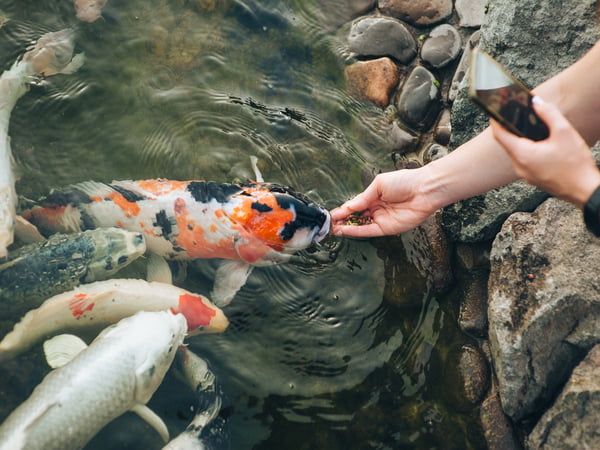
How To Limit Koi Fish Jumping Frequency?
When being in nature, jumping into a different pool may be beneficial to the koi fish’s survival, since this can help change the water environment and quality. In the cavity, the jumping behavior may be dangerous as they may be ends up dying dried.
Completely preventing koi fish from jumping is impossible since this is a normal, natural behavior of the fish. Unfortunately, it is possible to reduce their jumping frequency by fixing the problems that your koi fish may confront.
Remove harmful factors in the water
One of the most critical causes of the death of your koi fish is the poor water quality. The poor water quality can come from many factors, notably the high ammonia and nitrate levels, inappropriate pH values, and a large amount of unwanted bacteria.
Fixing ammonia and nitrate levels:
As you’ve already known, fish produce ammonia as a waste product. The more they eat, the more ammonia they produce. Nevertheless, they are not able to live healthily in the water with ammonia. They can get gills burned which can lead to permanent damage when the concentration of ammonia is high.
When ammonia is not removed properly, il will be transformed into nitrites and subsequently nitrates. So, to avoid this, you should frequently get rid of the ammonia by applying filtration systems and getting more beneficial bacteria into the water.
Correcting the pH level:
Incorrect water pH can stress out your koi fish and may eventually cause sickness and death. The ideal pH range for the aquatic environment for the fish to live in is from 7.0 to 7.5. In fact, the fish can live in the broader pH range: 6.8 – 8.2.
The pH levels can be naturally changed but the change must be kept to the minor and is recommended to stay in the mentioned ranges. The sudden changes and extreme pH, which is out of the recommended range, can harm the fish and make them more vulnerable to bacterial infections. Thus, the water’s pH should be regularly checked and modified if needed.
Eliminating unwanted (harmful) bacteria:
Some bacteria are necessary for maintaining your water’s quality, but others can make your fish ill. As a result, jumping behaviors of koi fish may become more problematic. The main reason for the increasing harmful bacteria amounts is poor water quality.
If you continue to have problems with poor water quality and excessive bacteria levels, you may need a better filtration system. It can also be helpful to use a UV sterilizer, especially if your pond is prone to recurring diseases.
Increase oxygen levels
Koi fish jumping out of their ponds is commonly attributed to a lack of oxygen. Most often, raising the oxygen level is a simple process, but to raise it sufficiently, you may need to try several solutions.
One of the reasons for low oxygen levels in water is the high water temperature. As the water gets warmer, the amount of dissolved oxygen decreases considerably. Therefore, the ponds will exhibit significantly low oxygen concentrations in the summer as the water gets hotter. Another factor reducing oxygen levels in the water is algae. During the summer, it appears more common, resulting in even lower levels of oxygen.
The ideal ponds for koi fish should have an oxygen level above 3 ppm and below 10 ppm. Using the correct test kit, you can measure the level of oxygen in your pond. This can help you figure out if this oxygen-related factor is causing the issue to your fish.
Using an air pump is also a simple way to increase oxygen levels. This will help stimulate the movement of water in the pond, and thus the amount of oxygen is further increased.
It is possible to add oxygen stones as well, which work in a similar manner but on a much larger scale. By using them, air bubbles are introduced to the water and mixed to add more circulation, increasing oxygen levels.
Provide sufficient depth and hiding/shading places
As the koi fish usually seek places that provide enough shades or swim deeply to avoid the heat from the sun. If they are not provided with shades or the pond is shallow, they may get sunburns and jump to ease the irritation.
To provide more shade for your koi fish, you can plant more trees surrounding the pond or just take a sunshade and have it spread across the pond.
Shading water is one of the essential factors to prevent your koi fish get injured because of jumping out of the water. Before keeping koi fish, you should keep this in mind as this will help you get the right and appropriate depth and setup for your fish ponds.
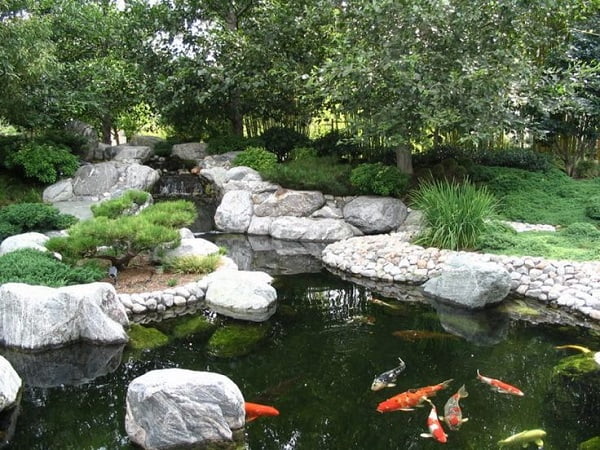
Reduce overcrowding
Overcrowding causes many problems. The common problem of a pond containing too many fish is the accumulation of waste and the shortage of oxygen. These conditions cause the fish to become more aggressive, causing them to jump for escape. In addition, poor water conditions can lead to disease, which may stimulate their jumping rate even more.
In other words, overcrowding is a fundamental cause of koi fish jumping, since it indirectly contributes to amplifying the effect of other situations that initiate the fish’s jumping.
The appropriate koi fish number you can keep in a pond is often 10, because they will breed, leading to an increase in population. Therefore, if you get more fish at the beginning, you will face an overcrowding problem more quickly. Conversely the fewer fish you start with, the lower the probability they have to compete for resources, and thus they will be happier.
Have taller sides
If your fish are accidentally jumping out of the pond, consider raising the sides. In this way, the fish will not be able to land outside the pond when they make small jumps because they will no longer be able to jump high enough to get out of the pond.
Furthermore, raising the height of the ponds’ sides can help prevent outside predators from approaching your fish.
Add netting
The best way to prevent your fish from jumping out of your pond is to add netting over the top. In the event of an underlying problem, netting allows you to keep your fish in a pond until the problem is resolved.
Additionally, your fish can be protected in this way from predators. In this case, a net might only be necessary during the night, as most predators are not active during the day when you can keep an eye on your pond.
Video: Koi Fish Jumping Out And Pond Setups To Prevent It
FAQs
How long can koi survive out of water?
Your koi fish will not be able to survive for long hours when being out of the water.
The fish can bring themselves out of the water if they see something out of the ordinary nearby, which can be fatal. Usually, the fatal part is when the fish jumps out of the water and strikes itself against objects on the surface; rocks, trees, etc.
How high can koi fish jump?
The koi fish can jump higher than you think, even up to 6 feet.
Why are my koi jumping and flashing?
When a koi is sunburned, it will have a slight pinkish hue that will turn darker and angrier as it becomes more damaged. When their skin gets irritated, they may jump and flash as a response to soothe and cool that area.
Conclusion
Koi fish like to jump because they are curious and want to explore their surroundings. However, jumping can present additional risks to your koi. The fish can be injured if they hit the rocks or the sides of the pond, and even hitting the water too hard can have detrimental effects. The act of jumping isn’t always an indication of your koi fish’s panic, but you need to keep it to a minimum.
In order to effectively prevent koi from jumping out of the pond themselves, installing netting can be the best method. Besides, you should first test your water to determine if there is a problem. There’s a high probability that the water contains a toxin such as ammonia or that the oxygen level is too low. Once you determine the source of these issues, you can easily resolve them.
I hope that this article helps you have a clear answer about “why do koi fish jump out of the water” and know more ways to resolve the problems causing your fish to perform extreme jumping behaviors.

Annette M. Chaney is an experienced marine biologist with over 20 years of experience as an aquarist and fishkeeper. She started her first aquarium at a young age, filling it with frogs and goldfish obtained from the ten-cent pet store.
Annette grew up caring for and breeding African Cichlids, which led to a hobby in high school that doubled as a profitable means. Attending Reed College gave her time to solidify herself as an accomplished aquarium caretaker with an eye for sales. After that, from 2009 – 2013, she studied at Roger Williams University – one of the most prestigious universities for Aquaculture and Aquarium in USA. She is the founder of AquariumCircle since 2010.
